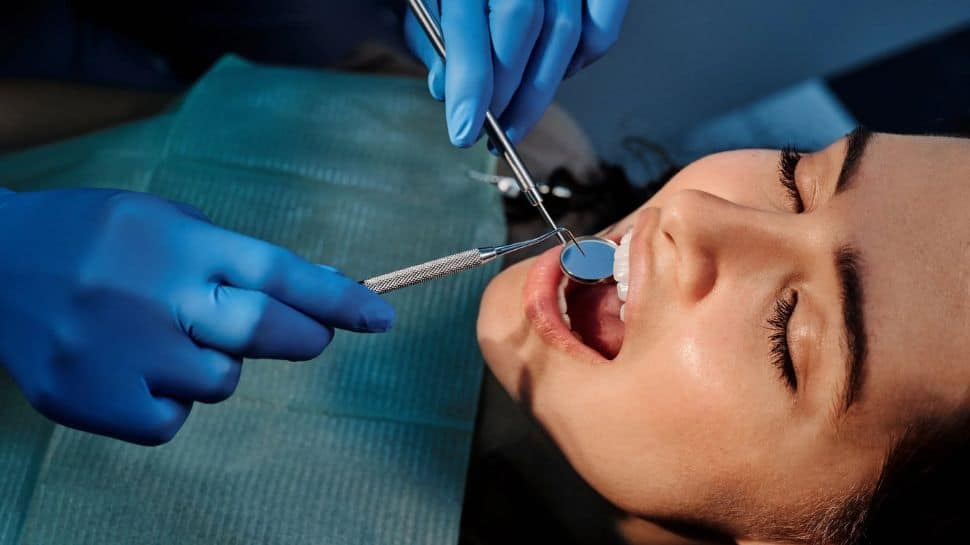On March 20 every year, World Oral Health Day is observed and the day aims to increase awareness about oral health by promoting oral hygiene, minimizing various risk factors that lead to oral diseases, and making people aware of accessing oral health services. So what exactly constitutes oral health? According to World Health Organization (WHO), “Oral health is the state of the mouth, teeth, and orofacial structures that enables individuals to perform essential functions such as eating, breathing and speaking, and encompasses psychosocial dimensions such as self-confidence, well-being and the ability to socialize and work without pain, discomfort, and embarrassment.”
World Oral Health Day: Symptoms Of Oral Health Issues
The WHO also mentions that “oral diseases are among the most common noncommunicable diseases worldwide, affecting an estimated 3.5 billion people”. Dr Renju Jose, Head of the Department and Professor, Department of Oral Medicine, and Radiology at Amrita Hospital, shares, “The mouth is the reflection of the body, making it crucial to take care of it. Gingiva or the gums hug the teeth, giving them support and nutrition. To maintain the health of the gums and teeth, proper dental hygiene is required.”
Dr Jose says a multitude of symptoms could indicate a dental health issue. These symptoms include:
- Foul breath
- Loose teeth
- Swollen and bleeding gums
- Mouth sores
World Oral Health Day: Basic Dental Care Practices
Dr Renju Jose shares with us the following dental health practices and easy tips one should follow to look after their teeth and gums:
1. Brushing, flossing tongue cleaning: Plaque and calculus serve as a bacterial stockpile from which bacteria can enter the body, causing systemic complications. Certain at-home practices that must be followed unquestionably include brushing your teeth twice daily, followed by tongue cleaning and flossing. One can add an alcohol-free mouthwash to the routine. It has been observed that massaging the gums in a circular manner at least once a day enhances their health by boosting blood flow.
2. Visit the dentist: A bi-annual visit to the dentist and subsequent extensive cleanings are recommended to remove the calculus that is affixed to the teeth’s surface but is otherwise left behind after brushing. Fillings, removable appliances, and dentures should be regularly inspected. Improper or dislodged fillings will lead to plaque accumulation and the progression of decay. Secondly, the sharp edges could injure the oral mucosa. Ill-fitting dentures could accumulate food debris, causing fungal infection presenting with a white to yellowish patch on the tongue. They are frequently accompanied by a foul smell and alteration of taste.
Also Read: Dental Care Tips – How To Prevent Bad Breath? Causes & Steps To Follow, Check What Experts Say
3. Check for ulcers, and bleeding gums: Recurrent ulcers, painful inflamed, and bleeding gums could have an underlying nutritional or immunological cause, which needs to be identified and eliminated. Tissue growth on the gums could be a result of pus accumulation from an associated tooth, trauma, or constant irritation. Differentiating and treating them will help prevent further complications.
4. Replace the missing teeth: Missing teeth should be replaced by artificial teeth that will, in turn, maintain the integrity of the covering mucosa and bone underneath.
5. Shed bad habits: Habits like chewing tobacco or smoking cigarettes have a demonstrated negative impact on gum health. Smoking is associated with the incidence of gingivitis, periodontitis, and malignancy in the oral cavity, whereas chewing tobacco causes increased gingival recession, exposing the tooth root surface, leading to plaque and calculus accumulation, and ultimately periodontitis.
Remember, taking care of your oral health is more than just cosmetic and can prevent much serious and even fatal complications. As Dr Renju Jose points out, “Following these simple steps will lessen the risk of systemic complications like diabetes, heart disease, strokes, and oral complications like oral cancer. Additionally, it will provide you with better teeth and gums, fresher breath, fewer dental visits, and a radiant smile.”















































